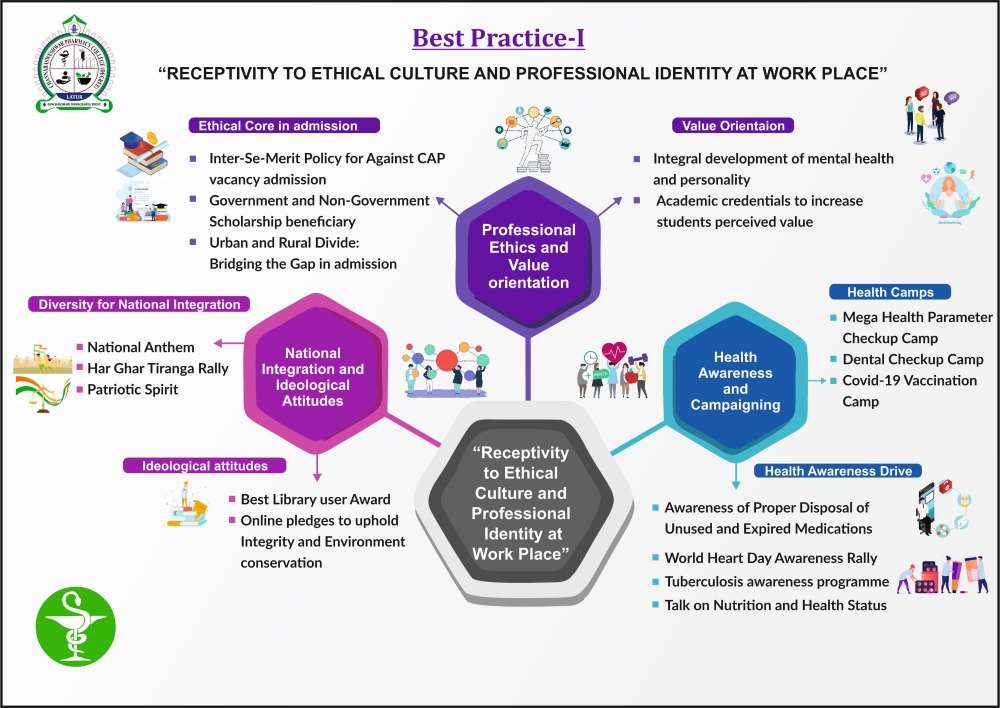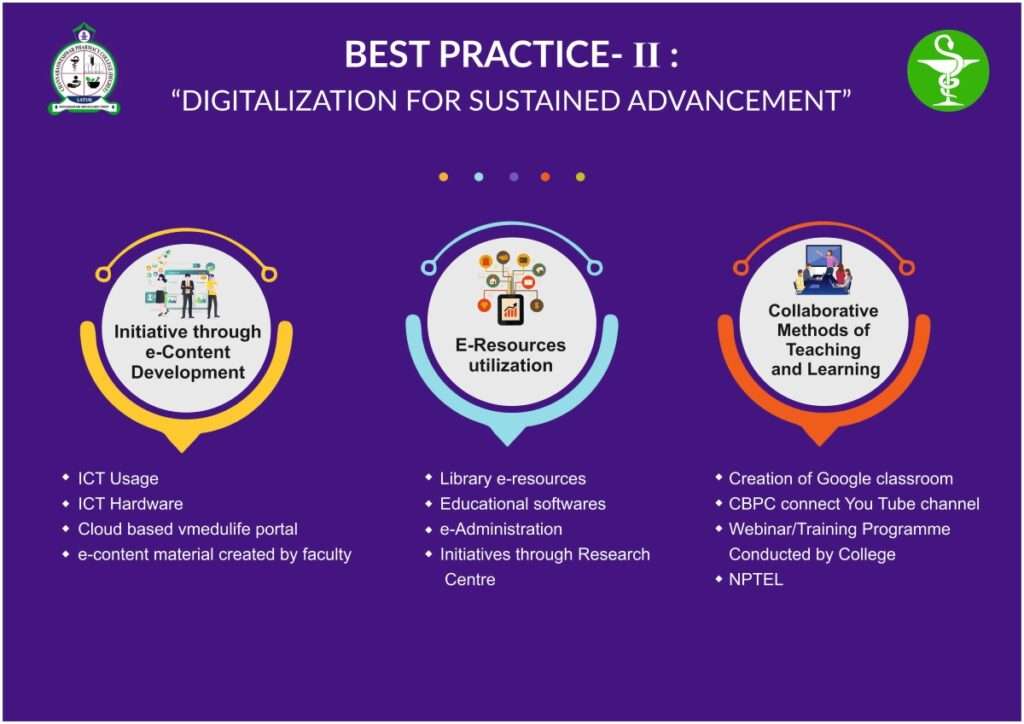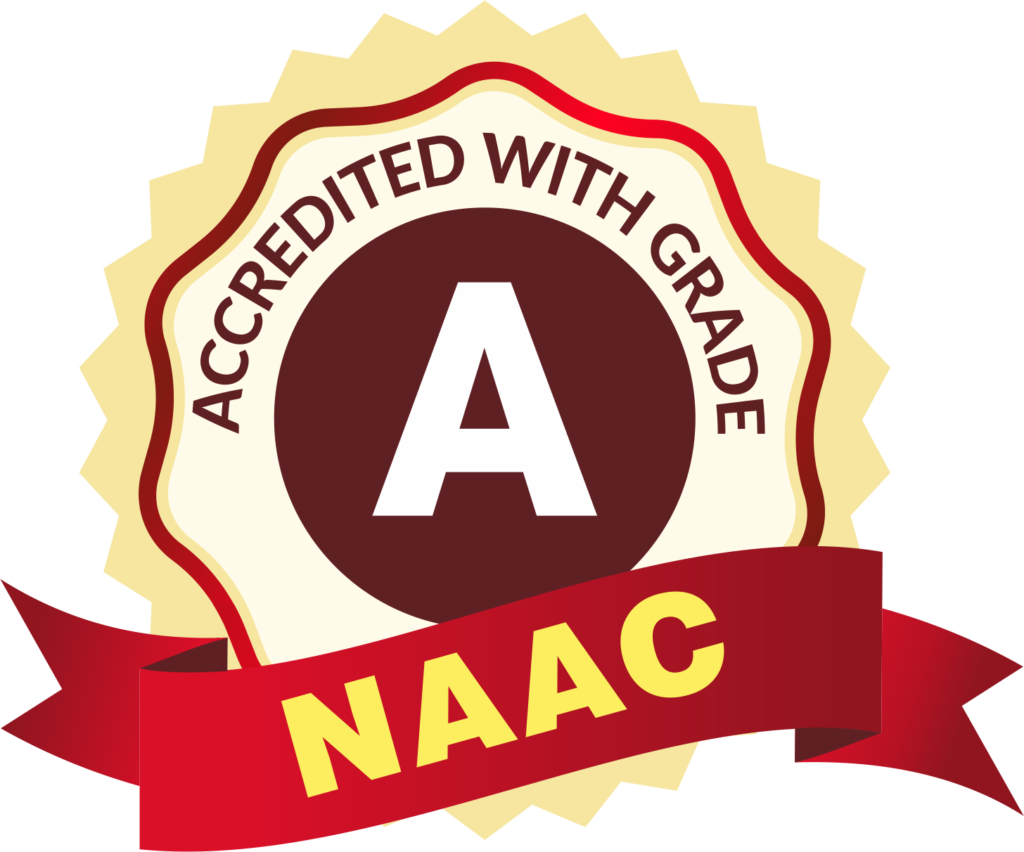Best Practice-I
RECEPTIVITY TO ETHICAL CULTURE AND PROFESSIONAL IDENTITY AT WORK PLACE

Objectives of the Practice:
- To foster ethical values among students and employees via initiatives such as only merit-based policy in admissions.
- To provide quality higher education to students from rural and urban areas by socioeconomic scholarships.
- To recognize value-oriented education that improves morals, self-confidence, merit and gender values
- To encourage activities that promote to realities of professional practice signifying the role as pharmacist.
- To promote ideological attitudes and put national integration into practice.
The Context:
Our institutes ideology rejects inequalities based on gender and occupation, and aims to bridge the Urban and Rural student gap. The college emphasizes their significant contribution to society. A sense of responsibility is imbibed through diverse initiatives, including healthcare camps, and awareness programs, COVID-19 preventive measures and pharmaceutical waste management, with the help of NSS unit. The institute has also contributed in fostering national integration and ideological attitudes for social unity. These values are ingrained in stakeholders through this best practice.
The Practice:
Since establishment, the college has implemented some sub practices to make the students adept with ethical education. Every year against CAP vacancies have been filled by Inter-se-merit only. Students admitted during last five year have bridged the gap of Urban and Rural divide and are supported to obtain Government and non-government scholarship. Communication skill, counselling session have equipped to our students with self-confidence and intellectual skills are identified through their academic merit. Students and staff are encouraged to participate in various activities which builds national integration. Active volunteer support by students and staff is provided with ideological attitudes.
Evidence of Success:
- Increased goodwill, reputation, and improved access from rural localities in admissions.
- Merit based socioeconomic scholarships fulfilled the objective of improving academic performance by scoring good percentage at examinations.
- Office of District Collector, Latur appreciated the college for tree-planting and cleanliness drive.
- Civil hospital, Latur, appreciated for conducting the COVID-19 vaccination camp.
- Students connected with society, counselled, and engaged with increased number of activities and their patriotism was encouraged.
- Better workplace culture, satisfied stakeholders and positive impact on outcomes.
Problems Encountered and Resources Required:
- Difficulties in monitoring ethical compliance
- One challenge that is striving to support good mental health for college students was how to reach those students who do not know they need it.
- Some students are found to avoid the program and deny some activities, our faculties guided them and they realized the importance of mental health and ideal practices.
- Difficulties in level of satisfaction and positive evaluation in the policies.
- Limitations of time available in conducting the professional identity and ideological attitude related program in the semester was major constraint, even though we are conducting various activities through NSS, Cultural and Sports in association with social organizations and NGOs.
Best Practice-II
Digitization for Sustained Advancement

Objectives of the Practice:
- To improve the quality of education through advanced teaching and learning techniques.
- To simplify the financial and administrative work by using various software systems.
- To inculcate students’ pharmacy knowledge through various e-library sources.
- To increase reliability and transparency in the academic system.
The Context:
Channabasweshwar Pharmacy College (Degree), Latur situated in an urban area and most of the students are admitted from rural areas. The rural-urban digital divide was mainly perceived to be a hindering factor in learning. The National Education Policy 2020, has also shifted from traditional education to outcome-based education. ICT knowledge has become an essential factor. A regular updating of ICT knowledge is a unified element in the learning process and administrative setup. Many faculty members were interested in creating e-learning video modules and ICT tools, that needed training and infrastructural support. An upgrade was also required to automate the college administrative office to improve efficiency and perpetuate records.
The Practice:
Channabasweshwar Pharmacy College (Degree), Latur aims to provide an effective teaching, learning, and assessment system for students. ICT has the potential to bridge the knowledge gap by improving the quality of education, increasing the number of quality educational opportunities, and enabling knowledge to be acquired anywhere. To alleviate obstacles such as the COVID-19 situation, natural disasters like floods, earthquakes, etc., Vmedulife software has become a boon. This practice has helped us to reduce malpractice, increase transparency and significantly reduce the number of students missing exams. The use of YouTube, Google Classrooms, and Zoom app is a powerful tool for online learning. Advanced learning can be done through various e-library sources. ICT-based practice has made the learning more interesting, easy to understand, creating a less paper and overall helping us to improve the quality of education.
Evidence of Success:
- The efforts taken improved efficiency, reliability, transparency and accuracy in teaching, learning and examination systems.
- E-content developed by faculty members is available on the S.R.T.M. University, Nanded website. Link: https://srtmun.ac.in/en/e-contents-video-lectures/300-faculty-of-science-and-technology/16249-subject-bpharmacy.html
- The college has initiated a greener approach through e-administration and moving towards way to less paper office.
- Faculty members encouraged to update their pedagogical skills through participation in various webinars and training programs.
- The Research Center, equipped with the various research and educational softwares, sophisticated instruments and 24/7 work culture for successful completion of PG and Ph.D. research projects.
- The learning through YouTube, Google Classroom, and e-library sources made students confident and face the challenges ahead.
Problems Encountered and Resources Required:
- Some students live in remote places where they are unable to access internet, and sometimes technical errors are raised due to unexpected internet issues. Slow/interrupted internet connectivity was major hurdle in live sessions during the pandemic. The live sessions are recorded and hosted in LMS module of Vmedulife.
- The electricity cutoff is the major issue while conducting online sessions. This problem was solved by using power UPS.
- Special training is required for teaching and office staff to learn efficient software handling.
- Technical errors have been solved by the expert person from Vmedulife, Pune on both offline and online mode and also conduct the training.
- Provision is made for future academic years for financial assistance in this regard.




